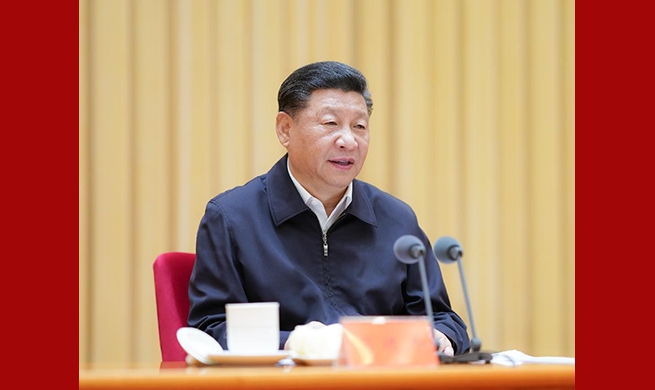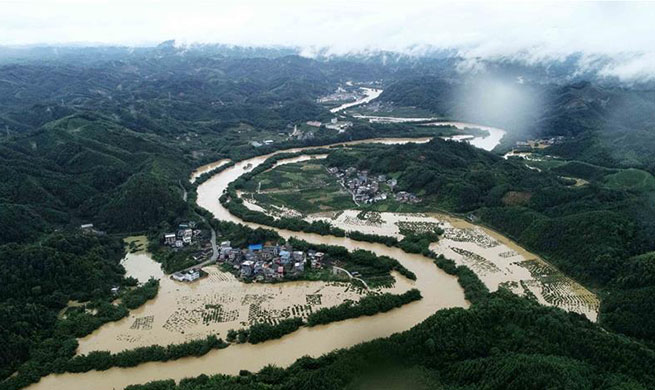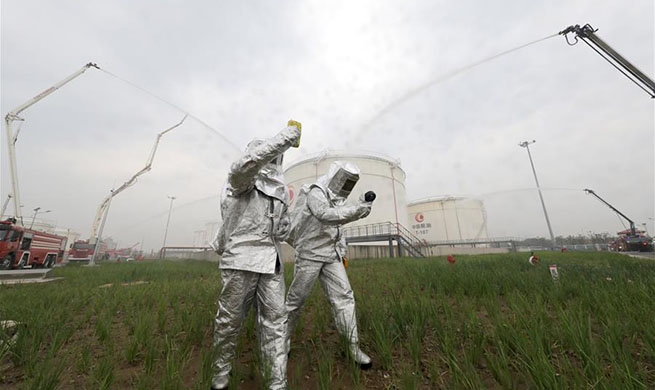by Xinhua writers Yang Shilong, Chang Yuan
ATLANTIC, the United States, July 9 (Xinhua) -- Recent historic wet weather in the Midwest has inflicted new woes on American farmers, who had already been hit hard by tariff battles against the country's major trading partners.
EXTREME WET WEATHER
"It's been cold and wet," said 71-year-old Bill Pellett beside his corn field in Atlantic, a small city in the Midwestern state of Iowa. "Crops are actually a little shorter than they should be."
Corn would be up to his shoulder at this time in a normal year, yet now it is only like "a foot and a half," said the fifth-generation farmer, who produces corn, soybeans and beef at his 6,000-acre family farm.
When Pellett was talking that mid-June morning, a storm seemed imminent as dark clouds gathered quickly on the horizon and thunder rumbled from afar.
Pellett, nonetheless, said he is "blessed to be able to get our crops in a very timely manner" while an array of states "are way behind" because of heavy floods and excessive rain.
"There will be a lot of farmers that will be in very bad shape at the end of the year, just due to the weather conditions that have existed this spring and may continue," Pellet said.
Disastrous wet weather has led to a record-low planting pace for corn and soybeans in the United States, according to the U.S. Department of Agriculture.
It delayed plantings and crop emergence, posing a threat to this year's corn and soybean harvest, Rick Kimberley, president of Kimberley Farms Inc., told Xinhua via WeChat.
"We have finished planting but everything is way behind," said the 69-year-old farmer.
Weather will get wetter and "cost more to dry down for safe storage," Kimberley said. "Because they will have a shorter growing season, the crops normally won't yield as good as normal."
PLUMMETING NET INCOME
American farmers' anxiety over financial stress is becoming acuter with U.S. farm exports decreasing dramatically as the U.S. initiated trade wars rumble on for over a year.
Farmers have seen their net income plummet by half since 2013 and are now expected to hold nearly 427 billion U.S. dollars in debt this year -- the most since the farm crisis in the 1980s, according to a recent report by U.S. political news outlet POLITICO.
The default rate for farm loans held by banks hit its highest level in seven years in the first three months of 2019, POLITICO said.
"President Donald Trump's trade wars are pushing America's rural economy toward a full-blown meltdown after years of financial hardship," it added.
As the market "continues to be slow going into this year," American farmers, soybean producers in particular, will "have to try to control their operating costs and day-to-day living expenses," Kimberley told Xinhua in an earlier interview.
"So a lot of those things, we just try to control our costs the best we can. Every household has its budget. They'll probably try to see where they can cut some corners there. Basically, that's what we're down to now," he added.
Farmers are always prepared to withstand pressure resulted from adverse weather, but not from such kind "artificially made by government policies," Kimberley said, adding that he could hardly imagine what U.S. agriculture would suffer if the tariff tensions linger for another year or two.
"If you have a long enough period where you're not successful or you're not being profitable, well, then you have to make a decision," he said.
HOPE FOR TRADE DEAL
Apart from sun-drenched seasons, farmers and agricultural groups also hope for a comprehensive deal reached between the United States and China after the two sides agreed to restart trade talks following the meeting between Trump and Chinese President Xi Jinping during the 14th Group of 20 summit in Japan.
American farmers "are one of the casualties here with trade disruption," U.S. Agriculture Secretary Sonny Perdue told CNN recently.
Over the last decade, Chinese purchases of U.S. soybeans have averaged annually 11.3 billion dollars in sales, showed official data. In 2018, soybean exports to China totaled 3.1 billion dollars, a drop of nearly 75 percent from 2017.
In May, Perdue announced a 16-billion-dollar package of farm aid payments to help offset losses endured by U.S. farmers.
The package followed an earlier 12 billion dollars in aid the Trump administration dispensed last year through the new Market Facilitation Program, which was aimed at compensating for the losses incurred as a result of the trade disputes.
The aid is "only a short-term fix" for a very long-term problem as it fails to provide "predictable, consistent and adequate relief" across the U.S. agriculture, said Roger Johnson, president of the National Farmers Union, which advocates on behalf of nearly 200,000 American farm families and their communities.
"It's never enough. I mean, we can't afford to do everything for everyone ... If you get 20,000 dollars, you know, say from the aid program, it will pay off a little bit. But it still is hurting not to have the trade where it was," Pellett said.
Potential loss of the Chinese market for U.S. pecans is most worrisome, said James Vaughn, a farmer from Forsyth, Georgia, which is a major nut producer, in a recent interview with Xinhua.
There was "a lot of expansion due to the Chinese demand for the pecans," he said. "That market is gone and it's severely impacted the price for them."
China was the biggest consumer for U.S. pecans last season, buying one fifth of U.S. supply and nearly one third of all U.S. exports. "So I know they would like to get this (trade tension) resolved quickly," Vaughn noted.
"During my law practice for 35 years, I've always tried to get people to solve problems and not fuss about them," said Vaughn, also a lawyer. "Because when they fuss about them, it just causes more problems and it causes lasting problems."
"That's not good. We don't need to be fussing. We need to trade, right?" he said.
"So let's look at the big picture, not our petty differences," Pellett said. "By working together, we can solve those issues more quickly and more beneficially."













